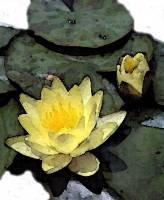|
|
 Image by Perry Slocum Stylized by Kit Knotts |
|
M. Latour-Marliac, grand-nephew of the famous Bory de Saint Vincent (the well known traveling botanist, who died a general and peer of France after having been exiled by the Bourbons (= members of the Royal Family J.B.) in 1887, published a series of articles in the periodical The Garden to draw attention to the present topic. The distinguished amateur (whose father had published botanical studies on the flora of the South of France) started cultivating Nymphaeaceae and hybridizing them. His Establishment, founded in 1875, still is the great producer of Nymphaeas at present. The famous horticulturist Godefroy- Leboeuf, from Argenteuil near Paris, however, attracted his attention to a red Nymphaea, which was then cultivated in Boston, USA. This horticulturist was so kind as to have a plant of that famous Nymphaea sent from America and this was the starting point of creating all the varieties obtained since then. This is what M. Godefroy-Leboeuf then wrote to M. Latour-Marliac: "The Nymphaea odorata rubra is a plant that I received from America through the intermediary of the doyen of American horticulturists, Mr. Hovey. He was here in 1878 and saw a flowering Nymphaea Caspary at my place. He told me that near Boston there was a variety with flowers of a such more brilliant pink, that those flowers were sold at a dollar apiece and that the monopoly was in the hands of one of his neighbours, who had never been willing to sell the plant. Hr Hovey asserted that on no account this neighbour would part with his goose that lays the golden eggs. I urged him to try the deal and put a thousand francs at his disposal. After a few months I received five or six plants as my share and Mr. Hovey kept the rest."
Through fortunate and intelligent hybridizations, M. Latour-Marliac
succeeded in producing hardy Nymphaea varieties of all colourings:
pink, carmine, red and all the shades of yellow. In 1887 appeared
the famous Nymphaea Marliacea in the variety chromatella, which
created a sensation as it was the starting point of a particular
breed, first rate for its dimensions and the exceptional quality
of the flowers which remain open nearly all day. They measure
16 cm. across and are of a beautiful canary yellow, whereas their
outer petals take on a soft pink tinge. The very vigorous leaves
are erect above the water, where they form real clumps. Their
circumference is 90 cm. and they are marbled reddish brown. M.
Latour-Marliac's catalogue mentions a real collection of Nymphaeas.
Water Gardening's History